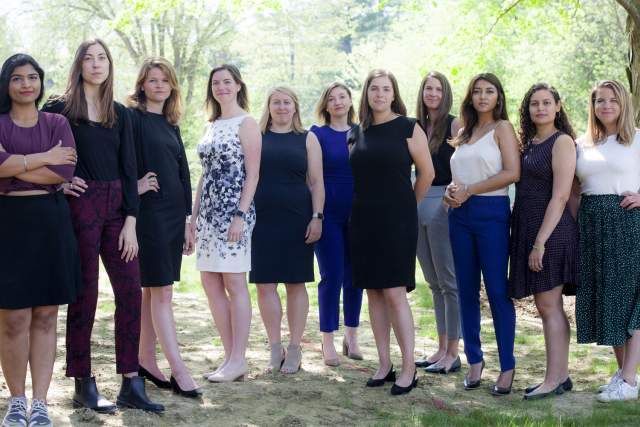Finance 2.0: Making DEI Your Business

(left) Dawson Her Many Horses T’10, Senior Vice President, Head of Native American Banking, Commercial Banking, Wells Fargo; (right) Elizabeth Jimenez T’19, Senior Vice President, Strategic Risk, Citi
Wall Street hasn’t historically been known for being a diverse place to work, but that’s finally beginning to change. Banks are pledging to hire more women and people of color and are talking about complicated racial issues that were once rarely spoken about.
“Financial institutions have become more open to having discussions around diversity, equity, and inclusion,” says Dawson Her Many Horses T’10, Head of Native American Banking for Wells Fargo. “When I talk to bankers about the work that we do, I’ve seen more willingness to address racial issues, such as the ones surrounding George Floyd, whereas in the past, I feel like it would have been different.”
Her Many Horses, who is a member of the Rosebud Sioux Tribe of South Dakota, currently leads Wells Fargo’s non-gaming tribal lending business. Wells Fargo, which has relationships with four out of 10 federally recognized tribes, has committed $3 billion in credit and holds $3.9 billion in deposits for tribal governments and tribally owned enterprises nationally.
I think I’m one of a handful of Native American bankers across the industry. I understand and know how profits from businesses impact tribal communities. To be able to represent the institutions I serve and help our clients and prospective clients has always been very gratifying to me.
—Dawson Her Many Horses T’10
Her Many Horses and his team aim to help tribes find new business opportunities as their profits from casinos and gaming markets mature. Dawson was a banker to the casino industry for many years prior to his current role, and during the pandemic, regulators and policymakers reached out to him to make sure that tribal borrowers nationally could access the Main Street Lending Program and other programs that were being rolled out to help those in need.
“We were able to walk policymakers through how to structure loans to these borrowers and explain why some of the regulations that they were proposing would make tribes less willing to participate,” he says. “So, for me, that was a really cool experience to be able to leverage my expertise in this market and help policymakers as they helped tribes.”
Her Many Horses also serves as a Co-Chair of the Native American Visiting Committee at Dartmouth and as Co-Chair of Wells Fargo’s National Unbanked Advisory Task Force, which aims to give unbanked people, especially Black, Brown, and Indigenous underserved communities, better access to mainstream checking accounts.
“Some of the challenges that diverse communities face have been around for a long time. They’re stubborn and they’ve persisted,” he says. “And so, my hope is that as financial institutions, we can continue our focus on these communities and not be discouraged because there are not quick or immediate resolutions to these challenges because they’ve been around for a while.”
Within financial institutions themselves, leaders are pledging to create a more diverse workforce and fulfilling their targets. Citi, for example, met and exceeded its goal to increase representation among female and Black employees.
“Citi has been pretty vocal on diversity, especially with the protests related to George Floyd in 2020,” says Elizabeth Jimenez T’19, Senior Vice President in Citi’s Strategic Risk segment. “Our CFO Mark Mason published a poignant and personal statement related to it. It’s great to see authentic and vulnerable messaging coming from leadership. Mike Corbat, our last CEO, and Jane Fraser, the first woman to be CEO of a global bank, were also super supportive, and their combined efforts can move the needle.”
While Jimenez applauds these efforts, she says it’s just as important to have mentoring programs and pipelines that prepare young people for careers in finance. As the daughter of parents who grew up in rural Mexico, Jimenez credits the nonprofit Prep for Prep for setting her off on the right path. After participating in this leadership development program, which is targeted toward high-achieving minority students, she attended Williams College and Tuck before she earned a coveted spot in Citi’s rotational program in corporate finance. All of this, she says, was made possible with Prep for Prep, which she commends for creating its own infrastructure to address the structural systemic issue of gaining access.
Nonprofits are critical in empowering young talent, and I would not be here without Prep for Prep. Therefore, I will always give back to similar programs.
—Elizabeth Jimenez T’19
“If you’re first-generation American, let alone among the first in your family to graduate from high school, college, or graduate school, and no one you know has ever been in these spaces before, how are you expected to succeed socially in these spaces? Especially once we add the complexity of being a non-white woman in an industry dominated by white men?” says Jimenez. “People never really talk to you about the possibility of being a Managing Director at a bank. It’s tough mental gymnastics, to see yourself in a role, not to mention striving to be a leader in a seemingly unattainable industry. These nonprofits are critical in empowering young talent. I would not be here without Prep for Prep or The Consortium for Graduate Studies in Management. Therefore, I will always give back to similar programs. We need an ecosystem of support for talented underrepresented groups. When programs like Prep for Prep, Tuck, and the Consortium produce top students, and companies like Citigroup hire and nurture these leaders, we can finally see a real transformation in representation among industry leaders.”

5 Strategies for Advancing DEI in Your Organization with Chief Diversity & Inclusion Officer Laura Shen T’17
“It’s been an exciting opportunity for me to create something new,” says Laura Shen, T’17, of her role as Chief Diversity & Inclusion Officer at WEX, the fast-growing global commerce platform headquartered in Portland, Maine.
Shen is the first to serve in the newly-created position, one that she says has “no cookie cutter job description or qualifications” but offers plenty of room for growth.
“What stood out about this role was the opportunity to create something that would come to life for an organization that’s nearly 6,000 people in 16 different countries,” Shen says. “It was a unique proposition for me, something that you don’t get many times in your career.”
Here’s what Shen has to say about what she’s learned on advancing DEI in the workplace.
- Think outside the box.
In the past six months, I’ve been working with talent acquisition to think differently about where and how we recruit. I have also partnered with our Technology, Legal, and Compliance teams on expanding employee self-identification so that we can better understand our employees, which can in turn allow us to consider: How are we serving them from a benefit standpoint? How are we creating more flexible work processes and programs to support them? For example, take military spouses. How can we provide a strategic leave policy for them when their family might be switching bases? Sometimes it’s the little things. Do we have feminine hygiene products in all our bathrooms? It’s the big things and little things. - Empower your employee resource groups.
We are up to nine employee resource groups (ERGs), and we’re piloting a program that gives them an earmarked amount of money to donate to causes that are meaningful to the communities they represent. It’s another way to empower our employee resource groups. ERGs are incredible sources of community and voice, and they’re hubs of vibrant programming, but I also view them as advocates that are driving inclusive change to create the WEX of the future. - Embrace a holistic perspective.
I get excited by thinking of more holistic ways to talk about people’s differences. Visible diversity like race and gender is critical to equity in the workplace, but there is more to people than meets the eye. What is difference? What is diversity? How can we think more broadly about the various differences that employees, partners, and customers have, which allows us all to think differently, innovate quicker, and drive better business outcomes. - Training that encourages employees to think differently.
Nearly all of our full-time and part-time employees, interns, and contractors have completed our internal training on unconscious bias. But DEI training should be like risk and compliance training. It should be annual and build upon itself. It’s not just like, “Oh, check the box. Our company did what was required.” It should be: Here’s what the next version looks like, so that I can move from unconscious bias to psychological safety and continue to build our collective understanding around DEI topics and concepts. It shouldn’t be, “I listen to this for 30 minutes, and I press skip each time.” It should be live conversations with teams, where leaders bring employees together and actually engage with the content in a way that makes them think differently. - Listen and respond to what your employees want.
How do you measure inclusion? I view inclusion in a similar way to culture. Assessing it can feel nebulous at times. You might have some data, but it requires new ways of listening and careful interpretation based on company content. At WEX, we have an annual employee survey, pulse surveys, and focus groups, but it’s not just about employees providing answers. It’s about us providing responses and having our employees see change take place. Whether it’s pronouns in the workplace or otherwise. How are we hearing people and then making cognizant efforts to say, “O.K.—we hear you, and here’s the path forward.”
This story originally appeared in print in the summer 2022 issue of Tuck Today magazine.

